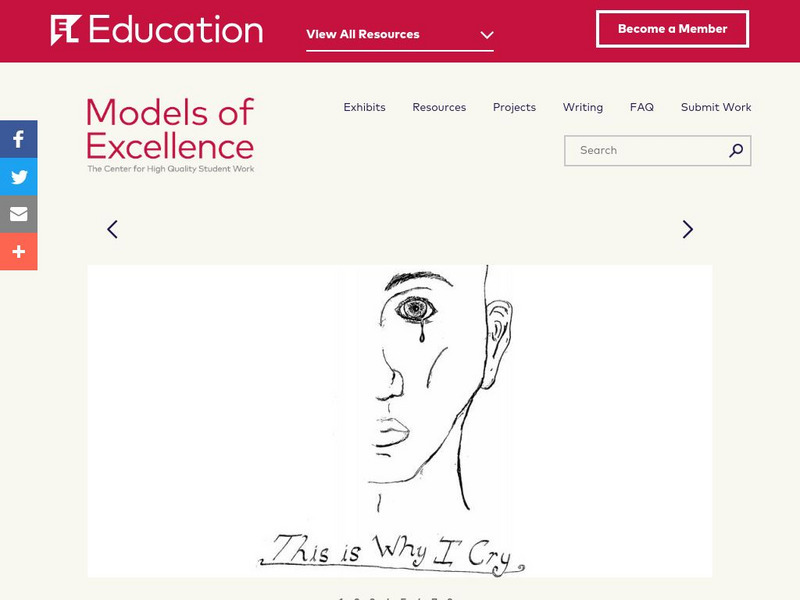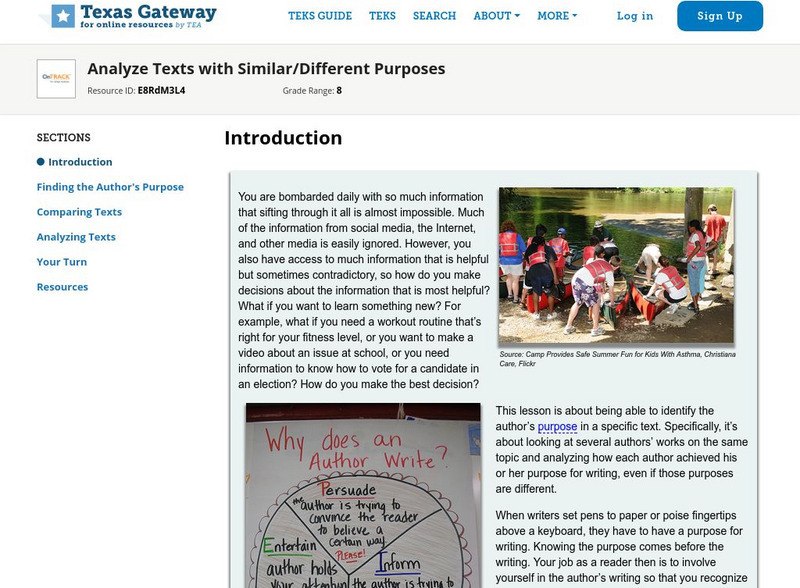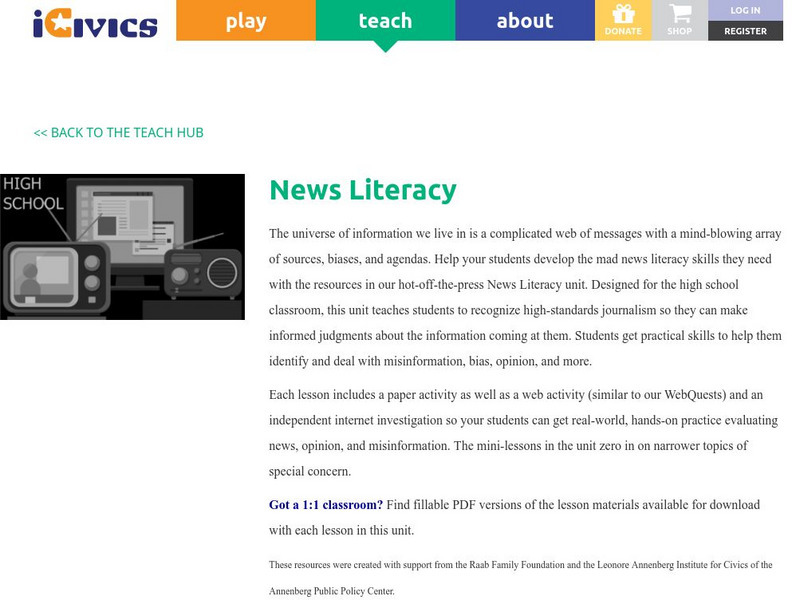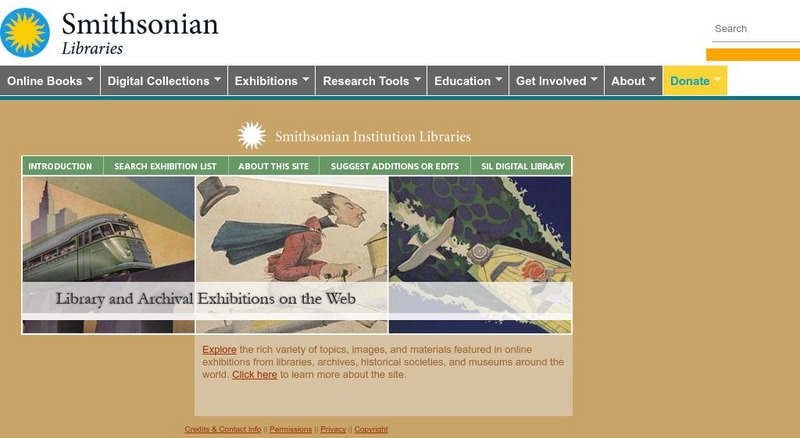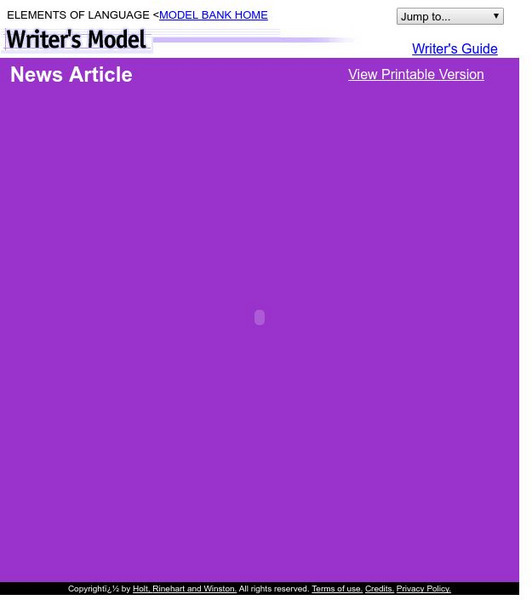Media Smarts
Media Awareness Network: Lesson Plan: How to Analyze the News [Pdf]
Lesson plan focusing on the importance of understanding how the news is a product with a specific scope, structure, slant and style at the forefront of its production.
Annenberg Foundation
Annenberg Learner: Interactives: Historical and Cultural Contexts
This interesting interactive website explains kinds of primary sources and gives you the chance to identify them in some games.
Duke University
Duke University Libraries: Finding Primary Sources
Finding primary sources can be difficult and confusing at times. This site provides a list of history databases, rare books and manuscripts, and research guides for those looking for primary resources such as diaries, letters,...
Huntington Library
Huntington Library: The Widening World of Books and Readers [Pdf]
In this lesson, 7th graders examine the widespread impact of the printing press on promoting literacy and spreading ideas across societies and between countries.
Huntington Library
Huntington Library: The Development of Writing and Books: Part Ii [Pdf]
In this instructional activity, learners examine early civilizations and the evolution of written language, at different early methods used to record information in writing, how these methods evolved, and at the impact of books on...
EL Education
El Education: This Is Why I Cry
Students gain a deeper understanding of slavery by creating an accurate portrayal of a character from history. Each historical character file they create contains a portrait, a biographical narrative, a character map, a bibliography, and...
Texas Education Agency
Texas Gateway: Evaluate Tone in Various Media for Audiences and Purposes
This lesson features several weather videos, both real and created, to help students understand how information and the tone changes based on the audiences and the purposes for the presentation.
Texas Education Agency
Texas Gateway: Analyze Texts With Similar/different Author's Purpose
[Accessible by TX Educators. Free Registration/Login Required] This lesson focuses on being able to identify the author's purpose in a specific text. Specifically, it's about looking at several authors' works on the same topic and...
Department of Defense
Do Dea: English 4; Wealth and Poverty
A learning module asking students to analyze different types of texts, learn literary terms, write a satirical essay and a mock newspaper article, and work with vocabulary skills all within themes related to wealth and poverty.
Better Lesson
Better Lesson: Cities in Mesopotamia: Understanding a Complex Text
In this lesson plan, 6th graders use details from a nonfiction article to create a visual representation and then, from that visual, provide evidence that demonstrates their understanding of the text. Includes samples of student work and...
iCivics
I Civics: News Literacy
Use this library of mini-lessons to teach students to recognize high-standards journalism so they can make informed judgments about the information coming at them and to help them identify and deal with misinformation, bias, opinion, and...
CommonLit
Common Lit: "On Tragedy" by Aristotle
In this chapter from "Poetics", Aristotle seeks to define "tragedy" as it relates to literature and human emotion. A specific purpose for reading and vocabulary notes are provided. This site offers links to paired texts, questions and...
Smithsonian Institution
Smithsonian Libraries: Library & Archival Exhibitions on the Web
This index of links offers the opportunity to explore important and interesting topics. Visiting links on the desired topic is most likely to provide primary sources or at least point students in the right direction.
Other
The History of the First Ten Newspapers in America
This site contains a brief history of the first ten newspapers printed in colonial America.
Other
History of Alternative Journalism in 20th Century
This site contains a timeline of the history of alternative journalism beginning in 1900. Includes description & brief discusses of various alternative publications.
PBS
Pbs Learning Media: News and Media Literacy
This collection, which includes videos, blog articles, student handouts, lesson plans, and tip sheets for families, helps students identify, analyze, and investigate the news and information they get from online sources. Media literacy...
PBS
Pbs Learning Media: Straight to the Source: Primary and Secondary Sources
Young scholars discover what primary and secondary sources are and how to use them in this activity from PBS Wisconsin Education. They watch video clips from the documentary "Wisconsin Hometown Stories: Neenah-Menasha," identifying the...
PBS
Pbs Learning Media: News and Media Literacy Collection
This collection, which includes videos, blog articles, student handouts, lesson plans, and tip sheets for families, helps students identify, analyze, and investigate the news and information they get from online sources. Media literacy...
Edutopia
Edutopia: How to Put Self Directed Learning to Work in Your Classroom
Self-directed learning is a natural pathway to deep understanding and efficacy. This article discusses the benefits of self-directed learning, the components necessary for this type of learning, and how to implement it in your school.
PBS
Pbs Learning Media: Learning From the People Collection
The ECHO Collection provides rich, multi-disciplinary educational resources in science, literacy and language arts, fine art, and social studies. The combined skills, experience, and collections of our six institutions provide...
Houghton Mifflin Harcourt
Holt, Rinehart and Winston: Writer's Model: News Article Example
This two-page news article includes a left-hand column with pointers on placement of critical features. Clicking on the "Writer's Guide" link in the upper right-hand corner of the page enables the user to get tips, directions, and...
George Mason University
George Mason University: World History Sources: Material Culture: Images
Investigate the meaning of different cultures' images and materials. Learn to examine different questions such as what is the image, what is the meaning, what is the function, and what is the social condition.
Columbia University
Leaks Necessary to News Reporting
Anonymous sources are a troubling fact of life for journalists and news consumers, according to this article that quotes some of the profession's heavy hitters.
Library of Congress
Loc: Teachers: Using Primary Sources
The Library of Congress provides teachers with a framework that will help integrate primary sources into all areas of the curriculum. Sections include "Why to Use Primary Sources," "Citing Primary Sources," and "Finding Primary Sources."


![Media Awareness Network: Lesson Plan: How to Analyze the News [Pdf] Lesson Plan Media Awareness Network: Lesson Plan: How to Analyze the News [Pdf] Lesson Plan](https://d15y2dacu3jp90.cloudfront.net/images/attachment_defaults/resource/large/FPO-knovation.png)


